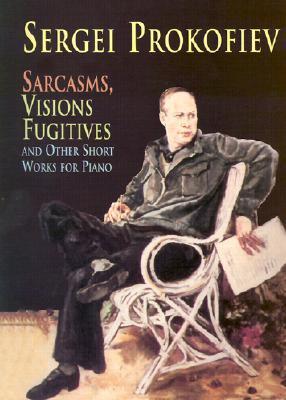Sarcasms, Visions Fugitives and Other Short Works for Piano

Sarcasms, Visions Fugitives and Other Short Works for Piano
One of the 20th century's most prolific composers of piano music, Sergei Prokofiev (1891-1953) is celebrated for his unique piano idiom, combining the seemingly incongruous elements of highly percussive textures with passages of great lyrical charm. "Above all," notes Grove's, "his music shows a professional care for the performer, never reaching beyond the practicable limits of execution."
Pianists will welcome this excellent new compilation of pieces composed between 1907 and 1922 -- the great formative years of Prokofiev's unique approach to keyboard writing -- from his highly original Diabolical suggestion and the dramatic, capricious Sarcasms to the very popular March and Scherzo transcribed by the composer from his opera The love for three organs.
Reproduced from authoritative early editions, this generous collection includes Four tudes, Op. 2; Four pieces, Op. 3; excerpts from Four pieces, Op. 4; Toccata, Op. 11; Ten pieces, Op. 12; the complete Sarcasms, Op. 17, and Visions fugitives, Op. 22; Tales of the old grandmother, Op. 31; Four pieces, Op. 32; and the March and Scherzo, Op. 33ter.
One of the 20th century's most prolific composers of piano music, Sergei Prokofiev (1891-1953) is celebrated for his unique piano idiom, combining the seemingly incongruous elements of highly percussive textures with passages of great lyrical charm. Above all, notes Grove's, his music shows a professional care for the performer, never reaching beyond the practicable limits of execution.
Pianists will welcome this excellent new compilation of pieces composed between 1907 and 1922 -- the great formative years of Prokofiev's unique approach to keyboard writing -- from his highly original Diabolical suggestion and the dramatic, capricious Sarcasms to the very popular March and Scherzo transcribed by the composer from his opera The love for three organs.
Reproduced from authoritative early editions, this generous collection includes Four tudes, Op. 2; Four pieces, Op. 3; excerpts from Four pieces, Op. 4; Toccata, Op. 11; Ten pieces, Op. 12; the complete Sarcasms, Op. 17, and Visions fugitives, Op. 22; Tales of the old grandmother, Op. 31; Four pieces, Op. 32; and the March and Scherzo, Op. 33ter.
One of the 20th century's most prolific composers of piano music, Sergei Prokofiev (1891-1953) is celebrated for his unique piano idiom, combining the seemingly incongruous elements of highly percussive textures with passages of great lyrical charm. Ab
PRP: 123.69 Lei
Acesta este Pretul Recomandat de Producator. Pretul de vanzare al produsului este afisat mai jos.
111.32Lei
111.32Lei
123.69 LeiIndisponibil
Descrierea produsului
One of the 20th century's most prolific composers of piano music, Sergei Prokofiev (1891-1953) is celebrated for his unique piano idiom, combining the seemingly incongruous elements of highly percussive textures with passages of great lyrical charm. "Above all," notes Grove's, "his music shows a professional care for the performer, never reaching beyond the practicable limits of execution."
Pianists will welcome this excellent new compilation of pieces composed between 1907 and 1922 -- the great formative years of Prokofiev's unique approach to keyboard writing -- from his highly original Diabolical suggestion and the dramatic, capricious Sarcasms to the very popular March and Scherzo transcribed by the composer from his opera The love for three organs.
Reproduced from authoritative early editions, this generous collection includes Four tudes, Op. 2; Four pieces, Op. 3; excerpts from Four pieces, Op. 4; Toccata, Op. 11; Ten pieces, Op. 12; the complete Sarcasms, Op. 17, and Visions fugitives, Op. 22; Tales of the old grandmother, Op. 31; Four pieces, Op. 32; and the March and Scherzo, Op. 33ter.
One of the 20th century's most prolific composers of piano music, Sergei Prokofiev (1891-1953) is celebrated for his unique piano idiom, combining the seemingly incongruous elements of highly percussive textures with passages of great lyrical charm. Above all, notes Grove's, his music shows a professional care for the performer, never reaching beyond the practicable limits of execution.
Pianists will welcome this excellent new compilation of pieces composed between 1907 and 1922 -- the great formative years of Prokofiev's unique approach to keyboard writing -- from his highly original Diabolical suggestion and the dramatic, capricious Sarcasms to the very popular March and Scherzo transcribed by the composer from his opera The love for three organs.
Reproduced from authoritative early editions, this generous collection includes Four tudes, Op. 2; Four pieces, Op. 3; excerpts from Four pieces, Op. 4; Toccata, Op. 11; Ten pieces, Op. 12; the complete Sarcasms, Op. 17, and Visions fugitives, Op. 22; Tales of the old grandmother, Op. 31; Four pieces, Op. 32; and the March and Scherzo, Op. 33ter.
One of the 20th century's most prolific composers of piano music, Sergei Prokofiev (1891-1953) is celebrated for his unique piano idiom, combining the seemingly incongruous elements of highly percussive textures with passages of great lyrical charm. Ab
Detaliile produsului








